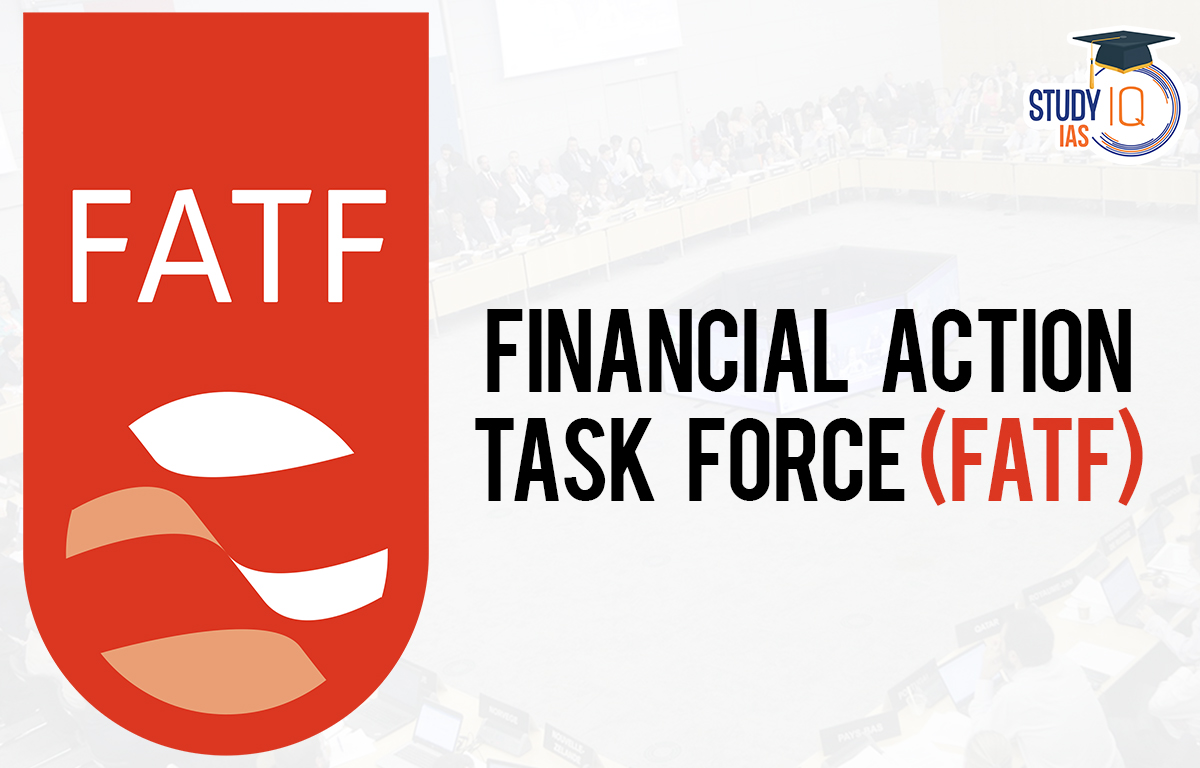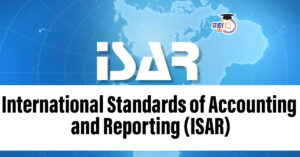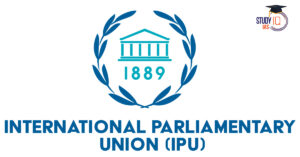Table of Contents
Context: Recently India hosted the Financial Action Task Force (FATF) Private Sector Collaborative Forum (PSCF) 2025 in Mumbai. It was organised by the RBI & Finance Ministry.
What is Financial Action Task Force (FATF)?
The Financial Action Task Force (FATF) was formed by the G7 to address the growing threat of financial crimes, including money laundering and terrorist financing. Over time, its mandate expanded to cover threats such as proliferation financing (funding for weapons of mass destruction). The FATF now has 39 members, including major economies like the United States, the United Kingdom, and India, as well as organizations such as the European Commission and the Gulf Cooperation Council.
Objective
To establish international standards and to develop and promote policies, both at national and international levels for combating money laundering and terror financing.
Members
There are a total of 40 members (38 Countries + 2 Organisations – European Union and Gulf Cooperation Council)
- Major countries: US, India, China, Saudi Arabia, UK, Germany, France, .
- India became a member of FATF in 2010.
FATF Headquarters
The headquarters of the Financial Action Task Force (FATF) is in Paris, France. The FATF creates and supports policies and standards to prevent and identify money laundering and terrorist funding, as well as conduct mutual assessments of member nations’ compliance with these standards. The FATF has a Secretariat that is in charge of the organization’s day-to-day operations and supporting its work.
Key Functions of FATF
The FATF operates with a clear set of objectives:
- Setting International Standards: FATF establishes standards for countries to implement stronger anti-money laundering (AML) and counter-terrorist financing (CFT) measures.
- Monitoring Compliance: FATF assesses the effectiveness of each member country’s AML/CFT systems and provides recommendations for improvement.
- Identifying High-Risk Countries: FATF highlights jurisdictions with strategic deficiencies in their AML/CFT frameworks by placing them on its Grey or Black Lists.
- Providing Guidance and Support: The organization offers recommendations and support to help countries strengthen their financial systems.
- Enhancing Global Cooperation: FATF fosters cooperation between international governments and organizations to combat illegal financial activities effectively.
FATF Changes Grey Listing Criteria to Focus on Nations Posing Greater Risk
The Financial Action Task Force (FATF) has revised its criteria for placing countries on its grey list, concentrating on nations that pose greater risks to the international financial system. The changes aim to target countries with higher financial influence while providing more support and flexibility to least developed nations (LDCs).
Key aspects of the new criteria include:
- Prioritizing High-Risk Nations: Countries that are FATF members, classified as high-income by the World Bank, or have financial assets exceeding $10 billion will now be prioritized for grey listing. These nations are seen as posing a more significant risk to global financial stability.
- Extended Support for LDCs: Least developed nations will be given longer observation periods and additional support unless they pose a substantial money laundering or terrorist financing risk. In such cases, they will still be reviewed, but with extended timelines for compliance.
- Tailored Action Plans: Countries on the grey list must work with FATF experts on specific action plans to address deficiencies in their anti-money laundering (AML) and counter-terrorism financing (CFT) systems.
This new approach allows FATF to focus its resources on high-risk nations while providing developing countries the opportunity to build more robust financial systems. Nations like Nigeria, South Africa, and Bulgaria remain on the grey list as they continue to address strategic deficiencies in their financial regulatory frameworks.
Also Read: International Organizations and their Headquarters
Financial Action Task Force Origin
The G-7 conference of industrialised countries in Paris in 1989 led to the creation of the Financial Action Task Force, a global organisation that monitors money laundering and terrorism financing. Its initial goal was to investigate and create strategies to combat money laundering. In 2001, FATF enlarged its mandate to include initiatives to combat terrorist financing in response to the 9/11 attacks on the US. It increased its efforts to stop the financing of the spread of Weapons of Mass Destruction (WMD) in April 2012.
Financial Action Task Force Members
It currently has 39 members, representing the majority of the world’s major financial centres. There are two regional organisations among the 39 members: the European Commission and the Gulf Cooperation Council. Nations that are FATF members:
| List of FATF Member Countries | |
| Argentina | Luxembourg |
| Australia | Malaysia |
| Austria | Mexico |
| Belgium | Netherlands |
| Brazil | New Zealand |
| Canada | Norway |
| China | Portugal |
| Denmark | Russia |
| Finland | Saudi Arabia |
| France | Singapore |
| Germany | South Africa |
| Greece | Spain |
| Hong Kong (China) | Sweden |
| Iceland | Switzerland |
| India | Turkey |
| Ireland | United Kingdom |
| Israel | United States |
| Italy | European Commission |
| Japan | Gulf Cooperation Council (GCC) |
| Republic of Korea | |
FATF President: Role and Responsibilities
- The President of FATF is elected for a one-year term and is responsible for providing strategic direction and overseeing FATF’s operations. The President represents the FATF in international meetings, defines the agenda for FATF sessions, and ensures that the organization’s goals are met.
- The President plays a crucial role in fostering international cooperation and ensuring that countries comply with FATF standards, helping to enhance the global financial system’s transparency and security.
Current FATF President
As of March, 2025, Elisa de Anda Madrazo of Mexico serves as the President of the Financial Action Task Force (FATF). She commenced her two-year term on July 1, 2024, succeeding Mr. T. Raja Kumar of Singapore. Prior to her presidency, Ms. de Anda Madrazo held various leadership roles within FATF, including a three-year tenure as Vice-President until June 2023.
FATF Grey List and Black List: Key Differences
FATF Grey List
The FATF Grey List also called the list of jurisdictions under increased monitoring, includes countries with strategic deficiencies in their anti-money laundering (AML) and counter-terrorist financing (CFT) frameworks. While these countries have committed to improving their systems, they have not yet fully implemented FATF’s recommendations.
- Being on the Grey List can lead to heightened scrutiny from international financial institutions, making it harder for countries to access global financial markets.
- Economic Impact: Countries on the Grey List may experience economic challenges, as financial transactions with international partners become subject to more extensive checks, affecting investments and international trade.
FATF Black List
The FATF Black List, also known as the list of non-cooperative countries and territories (NCCTs), includes countries with significant and ongoing failures to address AML/CFT issues. These countries pose a high risk to the global financial system, and FATF members are encouraged to apply enhanced due diligence when dealing with them.
Effects of being on the FATF Blacklist
- No financial help is given to those countries by the International Monetary Fund, World Bank, Asian Development Bank (ADB) and the European Union (EU).
- They also face a number of international economic and financial restrictions & sanctions.
- Blacklisted countries face severe economic sanctions, international isolation, and restricted access to global markets.
Current Countries on the Lists
- Presently Iran, North Korea, and Myanmar are currently on the FATF Black List.
- Philippines was removed from the grey list in February 2025 after addressing its strategic deficiencies.
- In February 2025, Lao PDR and Nepal were added to the grey list due to identified strategic deficiencies in their anti-money laundering and counter-terrorist financing (AML/CFT) regimes.
As of March, 2025, the Financial Action Task Force (FATF) has identified the following countries as Jurisdictions under Increased Monitoring, commonly known as the “Grey list”:
- Algeria
- Angola
- Bulgaria
- Burkina Faso
- Cameroon
- Côte d’Ivoire
- Croatia
- Democratic Republic of the Congo
- Haiti
- Kenya
- Lao PDR
- Lebanon
- Mali
- Monaco
- Mozambique
- Namibia
- Nepal
- Nigeria
- South Africa
- South Sudan
- Syria
- Tanzania
- Venezuela
- Vietnam
- Yemen
FATF and Pakistan
Pakistan has had a long-standing relationship with FATF, especially regarding its Grey List status. In June 2018, Pakistan was placed on the FATF Grey List due to concerns about its inadequate measures to combat money laundering and terrorist financing.
Steps Taken by Pakistan
To comply with FATF’s recommendations, Pakistan introduced several reforms:
- Strengthened its regulatory framework.
- Adopted new laws to tackle financial crimes.
- Enhanced the capabilities of law enforcement agencies to investigate and prosecute money laundering and terrorist financing.
FATF’s Decision
Despite progress, Pakistan remained on the Grey List until October 2022, when FATF acknowledged Pakistan’s successful implementation of its action plan. Following this, Pakistan was removed from the Grey List, but the FATF continues to monitor the country’s compliance to ensure lasting reforms.
Being on the Grey List had significant economic consequences for Pakistan, including restricted access to international financial markets, diminished foreign investment, and increased scrutiny of transactions.


 UNESCO Memory of the World Register
UNESCO Memory of the World Register
 International Standards of Accounting an...
International Standards of Accounting an...
 150th Summit of Inter-Parliamentary Unio...
150th Summit of Inter-Parliamentary Unio...






















